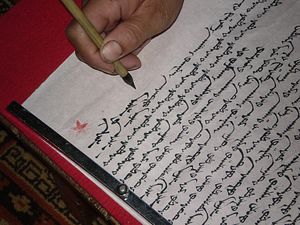With all the buzz around advances of Artificial Intelligence (AI), astounding progress in speech recognition, and appearance of on-the-fly translation technologies – like Google’s latest translation earbuds – we are seemingly on the brink of a new revolution in global communication. So much so that some prominent enthusiasts publicly advocate doing away with language learning in school. What’s the point, we are told. Google Translate to the rescue.
Of course, every so often we hear of horrendous stories of mistranslation, as in the case with the lists of ridiculous and outrageously funny Chinglish signs, which have entertained the Internet for years. The Chinese government recently and lamentably introduced measures to standardize translations. Meanwhile, automatic translation software is getting smarter, leaving less scope for getting things so badly wrong.
Unless the software goes rogue.
This seem to have happened with Google Translate’s Mongolian service. In a bizarre twist, it now recognizes unspeakable gobbledygook as legitimate sentences in the language of the nomadic nation. Consider a few examples:
The transliteration from Cyrillic would read: oooooooosdfsdfyayayasheyasheyasheyaooooooooo. The actual translation of “Thanks for your help” is “tusalsand bayarlalaa.” But this is the most decent mistranslation. Let’s try something else.
Just what the…
Hmmmm. If U.S. President Donald Trump could speak “Mongolian,” perhaps he would say something like this.
I am becoming a little concerned here.
Scratch that. I am becoming seriously concerned.
Well, this may actually explain it. And, to conclude:
Of course, you were. I’m warning you: another translation, and you’ll have molten lead poured on your microchips (wasn’t that Chinggis Khaan’s favorite torture method?)
The Russian Facebook page “Insane Asylum” (which first spotted the anomaly) has called the service “the Mongolian oracle.” Just type any rubbish you want, and, voila, behold the prophetic mutterings of artificial intelligence. That said, there is no telling what this function actually represents: a developer’s joke, a fried microchip, or some amazing advance of computer intellect. After all, didn’t we recently learn that Facebook had to shut down robots after they seem to have developed their own language?
My sense is that it is probably a joke but an unfortunate one at that. No Mongolian speaker would think of the language as gobbledygook. It is a beautiful, ancient language with a vast vocabulary and a centuries-old literary tradition. It is rhythmic and poetic, which is why I speak it, and my children speak it, even though we live half a world away from Mongolia.
I was genuinely puzzled by this “translation” and its implications for our trust in technologies and our growing dependability on machines. Fine – Google had a laugh at Mongolia’s expense. So did the rest of us. Let’s just be careful the next time. The Terminator may come sooner than we expect. And he’ll speak “Mongolian.”
Sergey Radchenko is Professor of International Politics at Cardiff University. Follow him @DrRadchenko.









































